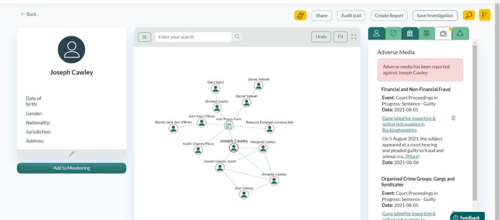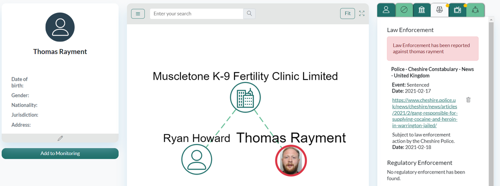20 February 2023
As part of their portfolio of trafficking activities, criminals are targeting some of the most helpless and innocent victims – puppies. As a lasting side effect of the pandemic lockdown, the demand for puppies in the UK has grown substantially in recent years. 3.2 million pets since the beginning of the pandemic alone, a large proportion of which were dogs. As a result, the illicit breeding and smuggling of puppies has become an increasingly common problem in the country as criminals seek to financially benefit from heightened demand.
From 2019 to 2020, the average price of common dog breeds, including daxons, bichon frises, and cocker spaniels, more than doubled to over £2,800. Hoping to cash in, criminals have taken “advantage of innocent pet buyers” who unknowingly leave with puppies that have been taken from their mothers too early or are born with severe health issues. Additionally, the value of these animals creates an ideal opportunity for illicit money to be laundered through the system, undetected by enforcement agencies. According to an expert at the Dogs Trust, the largest dog welfare charity in the UK, there has been a shift away from “opportunistic people bringing in a litter here and there” to now seeing many of the “same names cropping up,” indicating the increasingly organised network of dog smugglers and illicit breeders.
According to a report published in 2020 by the Dogs Trust, dogs entering the UK often come from southern or eastern Europe and smugglers transport the puppies in horrific conditions for long periods of time with little water and no food. By the time they reach the UK, they are severely dehydrated, malnourished, and traumatised from the trip, making their chance at survival slim if they are not rescued and given proper care.
The Pet Travel Scheme (PETS) 2012 is an EU law that regulates the non-commercial movement of pets, specifically dogs, cats, and ferrets, within the EU without having to be quarantined. Upon leaving the EU, the UK updated its regulations in January 2021 to comply with EU law. The requirements for a pet travelling between the UK and the EU or Northern Ireland are:
- A microchip
- A valid rabies vaccination
- An animal health certificate
- Tapeworm treatments for dogs if travelling directly to Finland, Ireland, Northern Ireland, Norway, or Malta.
As part of this, each person in a non-commercial vehicle can bring up to five dogs or cats into the UK. Technically by deeming the dogs to be non-commercial, a group of four can import 20 dogs in one car, paving the way for opportunistic criminals to exploit these regulations and circumvent the requirements for commercial imports.
In response, the Animal Welfare (Kept Animals) Bill, currently at the fourth stage of the bill passage process in the House of Commons, seeks to remedy criminals’ attempts to illegally import dogs under non-commercial regulations. In doing so, the Bill will reduce the number of dogs or cats that can be legally imported under the non-commercial rules to a maximum of five in one car. However, critics have suggested this number is still too high as a 2022 study reported that 99% of UK dog owners have 3 or fewer dogs and so there is a risk that it will often be criminals that will claim five pets as non-commercial imports.
The Bill will also expand protections for the movement of pets based on welfare requirements. It will include restrictions on importing pregnant dogs, a tactic commonly used by smugglers as it enables them to import a larger number of puppies without the need for paperwork or vaccinations. The import of puppies with cropped ears or tails will be made illegal and the minimum age at which puppies can be imported will be increased. Overall, the Bill aims to inhibit the tactics deployed by criminals to evade importing regulations and thus make it harder to smuggle puppies into the UK.
Experts we interviewed for this article are, however, wary of the lack of visual checks mentioned in the bill, providing opportunities for criminals to smuggle in underage, pregnant, or sick dogs with no repercussions. A 2015 investigation by the Dogs Trust resulted in investigators successfully smuggling a fake dog through British ports three out of four times. The dog had a microchip and passport, though no pulse, and was uncovered once only after the microchip malfunctioned and the enforcement agent went to scan the dog himself. Though a somewhat absurd investigation, it reveals the dark reality of smugglers that, without regular, enforced visual checks, run a very minor risk of being randomly selected for a check, increasing the incentive of smuggling valuable puppies.
CASE STUDY: FAMILY RUN PUPPY SMUGGLING OPERATION
Six members from the Cawley family led an illegal breeding and import operation in collusion with five additional ‘front men,’ illustrated in the Themis Search risk below. The puppies were imported to Milton Keynes from Ireland and many were sold with fake vaccination cards and severe health issues.
An investigation was launched following a number of complaints between June and November 2019 to the RSPCA and Trading Standards about puppies that had been sold from different addresses around Milton Keynes. The complaints detailed the general poor health of the dogs, including three which had died in the care of their owners and, though the reports were investigated in isolation, it became evident that the addresses were linked. In addition to the 13 individuals that were arrested, 51 dogs were seized, including Cocker Spaniels, Labradors, and Poodles, and four litters of puppies were born in the care of the RSPCA.
The defendants were charged at the Aylesbury Crown Court in August 2021, 10 of whom pleaded guilty to fraud, nine of those admitting animal welfare offences, and a further three also pleading guilty to animal welfare charges. Seven were given immediate jail terms, totalling over 18 years, the longest combined sentences given as a result of an RSPCA investigation, and all were disqualified from owning animals for 10 years.
This case is only one example of the increasingly common problem of puppy smuggling in the UK, which necessitates proper due diligence on all breeders to ensure interested buyers do not inadvertently purchase smuggled animals, as well as further action by the government to upend the illegal import of puppies. Our screening and investigations platform, Themis Search, is a useful tool for this necessary due diligence. With a quick name search, the platform is able to reveal a potential breeder’s criminal convictions or any adverse media against them, uncovering their potential links to financial crime. The risk map below reveals the large organised network implicated in the puppy smuggling ring, as well as their criminal convictions.

In the realm of organised crime involving dogs, a recent BBC Panorama investigation uncovered a ‘lucrative market of extreme dog breeding.’ Just as with puppy smuggling, the breeding of bulldogs with over exaggerated frames and muscles lends itself to a market whereby these animals are sold for upwards of £10,000. Breeders seek to create ‘unicorn dogs’ which combine every marketable characteristic, including hairlessness, merle patterns, and cropped ears, to extract the maximum profit. The dogs are often held in a ‘co-own', a network of individuals that house dogs for breeders in exchange for a percentage of the sale, allowing dealers to conceal the number of animals they possess and the profits they take in. Ultimately, the valuable market, coupled with the ease with which money can be laundered through the sale of the dogs, is of great appeal to organised crime groups.
As part of the Panorama investigation, BBC’s Sam Poling infiltrated the covert network of illegal dog breeding. She exposed one of the most notorious dog dealers, Thomas Rayment, who is in prison for major drug dealing charges, though has been maintaining the breeding operations with his co-partner, Ryan Howard. We mapped the connections using our platform Themis Search which reveal the links that illegal dog breeding has with wider organised criminal networks, further highlighting the flow of illicit money that is channelled through the selling and buying of extreme dogs.

Though it is important to pass legislation that regulates the smuggling of puppies, it is also necessary that as a buyer, one remains vigilant. When looking to buy a puppy, there are some tell-tale signs in the adverts and behaviour of the breeders that should raise suspicions of potential nefarious activity.
In an advert, these are some signs to look out for:
- The same phone number and/or description on multiple ads
- A pet passport as this means the pet has been imported
- Vaccinated puppies that are under four to six weeks old as they cannot legally be vaccinated before then.
When considering buying from a breeder, keep in mind that a good breeder should:
- Allow you to visit the puppies and mother, multiple times if desired
- Answer each and every question openly
- Provide genuine paperwork for vaccinations and show their own licence as a breeder.
And an irresponsible breeder will:
- Rush the buying process and force payment in cash
- Bar you from seeing the mother and make excuses for her absence
- Illegally sell the puppy before it is eight weeks old.
As heart-breaking as puppy smuggling is, it is a concerning problem facing the UK as a whole. The growing market value of puppies has incentivised organised criminals to circumvent import regulations in an effort to transport far too young, ill, and pregnant dogs from across Europe. The huge sums of money that come with this illegal trade risk it becoming an ever more common problem if the government does not step in and legislate strongly to curb the problem. Responsibility must also fall on puppy buyers to be aware of the risks of the market so that they can, themselves, investigate their breeders for illicit activity prior to purchasing their dogs.
It might come as a surprise that we are suggesting conducting due diligence on individuals we are looking to buy a dog from, though the developed and sophisticated network of criminality requires just this. Ultimately, a failure to take that extra level of precaution risks harming both humans and non-humans. Fortunately, Themis Search is an easy tool that can be used to screen individuals for a variety of criminal convictions, such as fraud, and adverse media that might highlight wider links to financial crime.
By Olivia Baker, Financial Crime Researcher, Themis